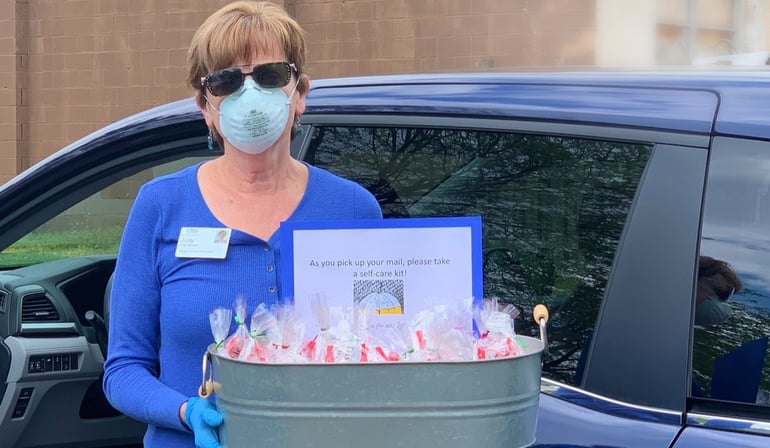No matter where you look, it’s clear that 2020 has been a year full of stress. There have certainly been many beautiful moments, too. But between the COVID-19 pandemic, protests against police brutality, and everything else going on in the world right now, seniors and caregivers alike could be facing fatigue right now.
Did you know there are many different types of fatigue and burnout you and your loved ones could be experiencing? Yes, depending on the circumstances you’re in, you could be feeling one of many different kinds of fatigue. Today we’re going to talk about four of the most common types of fatigue people are experiencing right now, as well as ways you can cope with them.
ERS’s Guide to Coping With Fatigue
1. Caution Fatigue
One of the most defining events of 2020 that history books will write about will be the COVID-19 pandemic. As our communities, country, and the world have worked to cope with this unprecedented virus in our lifetimes, there has been much to worry about in our lives. First and foremost, people are worried about the health and safety of themselves and their loved ones. Then, as many things were canceled, plans were changed, and lives have been altered this year, people have lost a lot.
Now that we’ve been in some state of quarantine, mask-wearing, and social distancing for at least five months. At this point, it can be easy to be “tired” of doing it. After following these guidelines for so long, it’s in our nature to start to become a bit lax on washing our hands, feeling like it’s okay to visit with others or attend gatherings or skip wearing a mask once in a while.
The virus is still very real and very much around us, so we all need help coping with caution fatigue. One of the best ways to do this is by shifting your mindset. Instead of being scared of the virus and using fear as your motivator, think about how wearing a mask and sanitizing your hands protects you and your family. By focusing on the benefits you gain, you’ll be more inclined to continue following these protocols.
2. Allyship Fatigue
In June, protests against police brutality began again, and the Black Lives Matter movement became center-stage for a prolonged period. As more and more people began to listen harder to the stories Black leaders were sharing, learning about history, and seeing the extent of racial injustice in our communities and our country, many people began to feel overwhelmed and like there was nothing they could genuinely do to help.
ERS strongly believes in the power of people. In keeping with our core value of Inclusion, we stand with our sisters and brothers, affirming all individuals’ infinite worth. There is much we can change, moving from a society full of racism and making our world a better place. Click here to read the letter from President and CEO Laura Lamb.
This is called allyship fatigue, and it’s not a reason to stop taking action entirely to fight racism and injustice. Instead, it’s a reminder to spend time taking care of yourself while still doing what you can to further the cause. Focus on what you can accomplish right now instead of looking at all the work that still needs to be done in the future.
3. Compassion Fatigue
Many people care for an older loved one right now, and especially with the guidelines, restrictions, and rules around COVID-19, that can be increasingly stressful. Sometimes the care we give to the people we love the most can begin to feel monotonous and even like a burden. Then, we chastise ourselves for feeling this way, and the cycle continues.
Compassion fatigue is a real experience, and if you think you might be feeling this way, it’s an excellent step to acknowledge it. Once you see that you are indeed feeling some compassion fatigue, you can work to counteract it. The most important way to do that is by focusing on your self-care. Schedule time for yourself every day, whether that’s exercise, chatting with a friend over Zoom, or meal-prepping healthy options for the week. When you’re at your best, you’re able to care for others well, too.
4. Work-from-Home Fatigue
While not technically a coined term, the fatigue and exhaustion many people are feeling after working from home for months are valid feelings. Between having to learn new technology, make sure your home workspace is presentable for Zoom meetings, and not having a choice in the matter, our brains are tired of this new normal.
Working from home also includes caring for an aging loved one or watching their children all day. Putting too many tasks on your plate can lead to fatigue and burnout quickly. To combat this, make sure you’re logging off from work at a regular time, and try to stick with your morning routine as much as possible. It can be easy to work for extra hours every day, but doing so will lead to burnout faster. Again, focus on taking care of yourself, and try to chat with your coworkers as much as possible, like you would during a typical day in the office.
Take a deep breath. No matter what type of fatigue you’re experiencing, life is difficult right now for just about everyone. Remember to find time to take care of yourself: exercise, eat well and get a good night’s sleep. Turn off the technology when you need to and focus on the blessings and positive things you do have.
For more tips to help you take care of yourself during this challenging time, we also invite you to download the Episcopal Retirement Services’ Positive Aging Guide and Caregiver Handbook. Both of these resources contain a wealth of information to help caregivers and seniors alike live well into the future.













